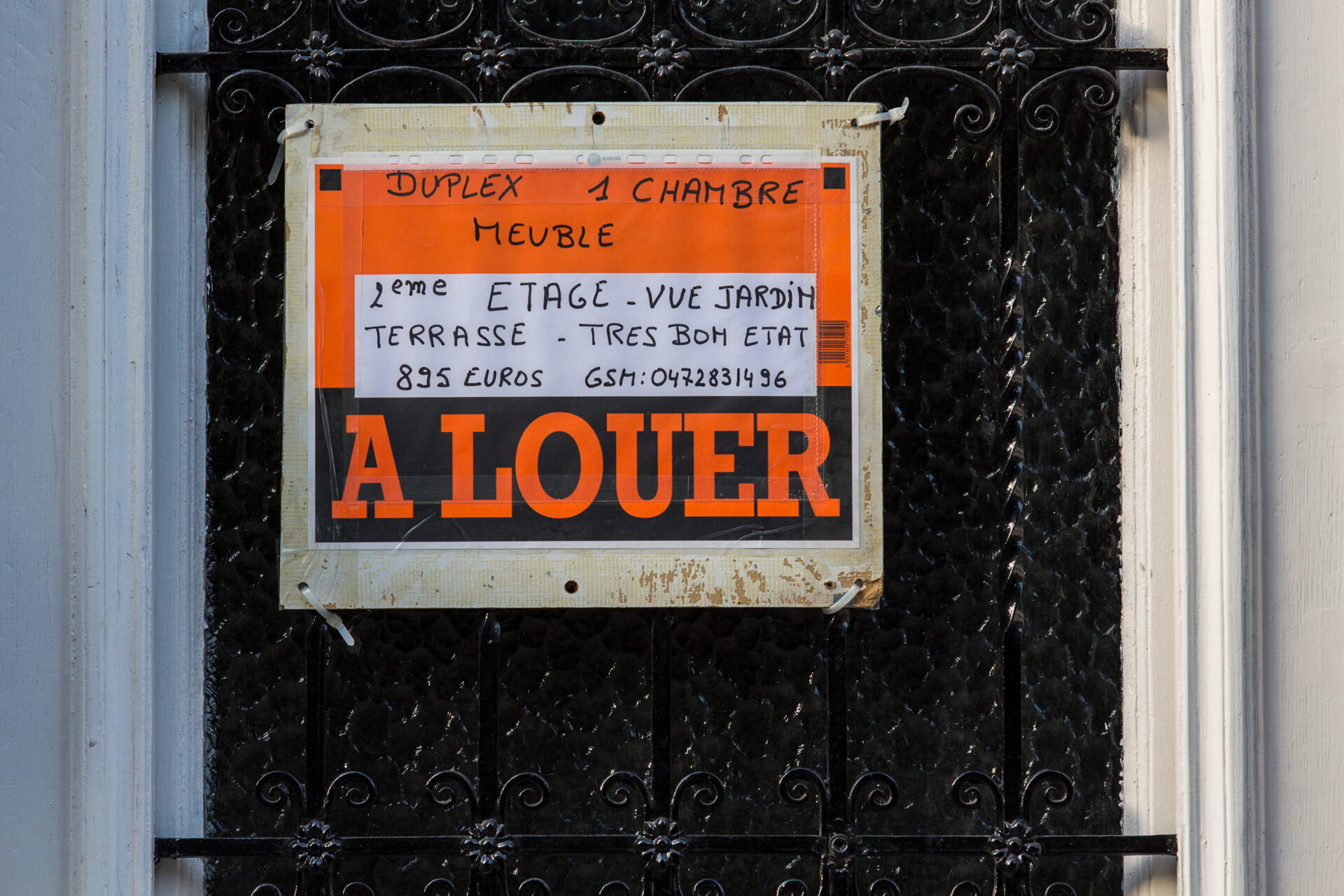More than 60% of Brussels residents rent the home they live in, and while most have a contract setting out the conditions of their tenancy, few may be aware of their rights when things go wrong.
Last week, the Brussels Parliament passed a new law to give tenants the right to buy the home they are renting before it is officially put up for sale on the market by their landlord.
This begs the question of what rules and measures are already in place to protect the many people renting a property in the Brussels region. We have listed the most important points below.
Pre-move
Contract
Belgium's three regions (Brussels, Flanders and Wallonia) have been in charge of setting the rules around residential leases in their respective territories since 2014.
In the capital region, the Brussels Housing Code has defined the rules for renting out property since 2018. It sets out the basics for a rental agreement for properties that will be used as the main place of residence, and what must be included in the contract.
For the contract, a landlord can ask for the tenant(s) name(s) and contact details, the number of people in a household, and an estimate of income (a pay slip, account statements, unemployment benefits, health insurance benefits, disability benefits). The landlord cannot demand any other information.

Credit: Belga/Siska Gremmelprez
The contract usually includes a description of the various spaces, how much rent will be paid and when, and the arrangements regarding the security deposit. Normally, it should also include an explanatory annex detailing the mutual rights and obligations of both parties.
Before the tenant moves in, a place description has to be drawn up. Here, it is recommended to make the place description as detailed as possible and take enough photos so there is no discussion at the end of the lease.
The landlord needs to register the lease within two months of signing it. If they fail to do so, the tenant can terminate the lease without notice or compensation, provided that they sent the landlord a formal notice to register the lease and that this notice has remained unanswered for one month.
Costs and indexation
In Brussels, the rent deposit can be up to two months in rent and serves to repair damage caused by tenants. The rental deposit should be paid back by the landlord provided there is no damage, which does not include usage wear and tear of the property.
This deposit can be blocked via the landlord or tenant's bank, meaning the release of the rental deposit can only be obtained on the basis of a joint declaration confirming that the money can be released.
The rent itself can be indexed once a year to adjust it to the cost of living. This can be done on the anniversary of the effective date of the lease: if the lease started on 1 September 2023, the indexation can be applied from 1 September 2024.
The rental prices of homes with an EPC label F and G can not currently be indexed.
After the move
The tenant is obliged to carry out maintenance work and repairs such as annual descaling, the maintenance of boilers and water heaters, sweeping of chimneys, and the inspection of the heating system. The landlord has to perform all major repairs such as the replacement of a faulty boiler, repair of the roof.
Normal wear and tear is also considered the responsibility of the landlord.
To check the general condition of the property, the landlord can visit once a year, but this must be communicated to the tenant at least seven days in advance.
The visit should also be mutually agreed upon by the parties, meaning the landlord cannot visit without having the tenant's permission.
Duration and end of lease
In principle, every agreement for properties that will be the tenant's main place of residence is entered for nine years.
In this case, either no specific duration is included in the written contract, or it is an agreement in which the duration is clearly stated between three and nine years.
After the nine-year period, the lease will end provided that one of the parties gives notice of termination at least six months before the expiry date. Termination can be done without cause and no compensation is payable by the party taking this initiative.
It is possible to conclude a shorter-term tenancy agreement for a minimum of six months and a maximum period of three years. The period for short-term leases cannot exceed three years in total. If an agreement concluded for two years is subsequently renewed for the same period, bringing the total duration to four years, it will become a long-term contract.
Both short and long-term contracts can be ended earlier without having to give a reason, but this is subject to three months' notice in writing to the landlord. The notice period starts from the first day of the month following the month in which the notice was served.
The tenant also has to pay three months', two months' or one month's rent respectively in compensation depending on whether the departure takes place in the first, the second or the third year. After the first three years, the tenant no longer has to pay compensation.
Related News
- Power to tenants: Brussels renters given precedence if their home goes on sale
- How to best avoid housing scams in Brussels
The law is much stricter for landlords: they can terminate the lease after one year if they will occupy the property themselves, or if it will be occupied by a family member. The landlord must mention the identity of the person who will occupy the property, and if the tenant requests it, they must provide proof of the family relationship within two months.
Three months' notice must be given by registered letter, while compensation equivalent to one month's rent has to be paid to the tenant.
If the notice of termination is not substantiated, it is not valid, meaning the tenant is entitled to compensation equivalent to 18 months' rent, unless the landlord can cite an exceptional circumstance why he was unable to comply with the legal conditions.
The agreement can also be terminated if construction or renovation works are needed on the leased property, but this can only be done after the expiry of a three-year period, and importantly, only after writing to the tenant six months in advance.
Problems with your landlord?
Tenants who feel their rented property does not meet the housing standards set out in the Brussels Housing Code can contact the Brussels Housing Inspectorate and find out if they are eligible for the rehousing allowance.
If the tenant knows they are in their right when having an issue or problems with a landlord, it is recommended to collect evidence of all contact, such as text messages and emails, to take photos of the problems, and to date these correctly.
There is no official mediator in Brussels to intervene when it comes to rental agreement issues. In extreme situations, the matter can be taken to court, but there are alternative ways to resolve conflicts between the tenant and the landlord, such as mediation, conciliation and arbitration.
In the first two processes, initiated on a voluntary basis, a third party is assigned. Mediation focuses on finding solutions that are negotiated constructively by all parties. The mediation agreement is accompanied by a dated document signed by the parties and by the mediator.
If the tenant and the landlord cannot agree on any of the points concerning the lease, a reconciliation procedure is started to avoid litigation. Either both parties come to an agreement here, or legal proceedings are started before the Justice of Peace.
Even if one of the parties wants to immediately file a lawsuit, the court will first try to reconcile the two parties. Here, it is advised to contact a legal expert. A list of organisations that can help can be found here.
A tenant can only be evicted after a judge has given the landlord permission to proceed with eviction. Eviction proceedings also require a bailiff. The Social Services (CPAS) will be notified of the eviction to assist the tenant in the most appropriate way.
Are you looking to move to Brussels and rent a property here? Find out about how to avoid getting scammed in the process first.

